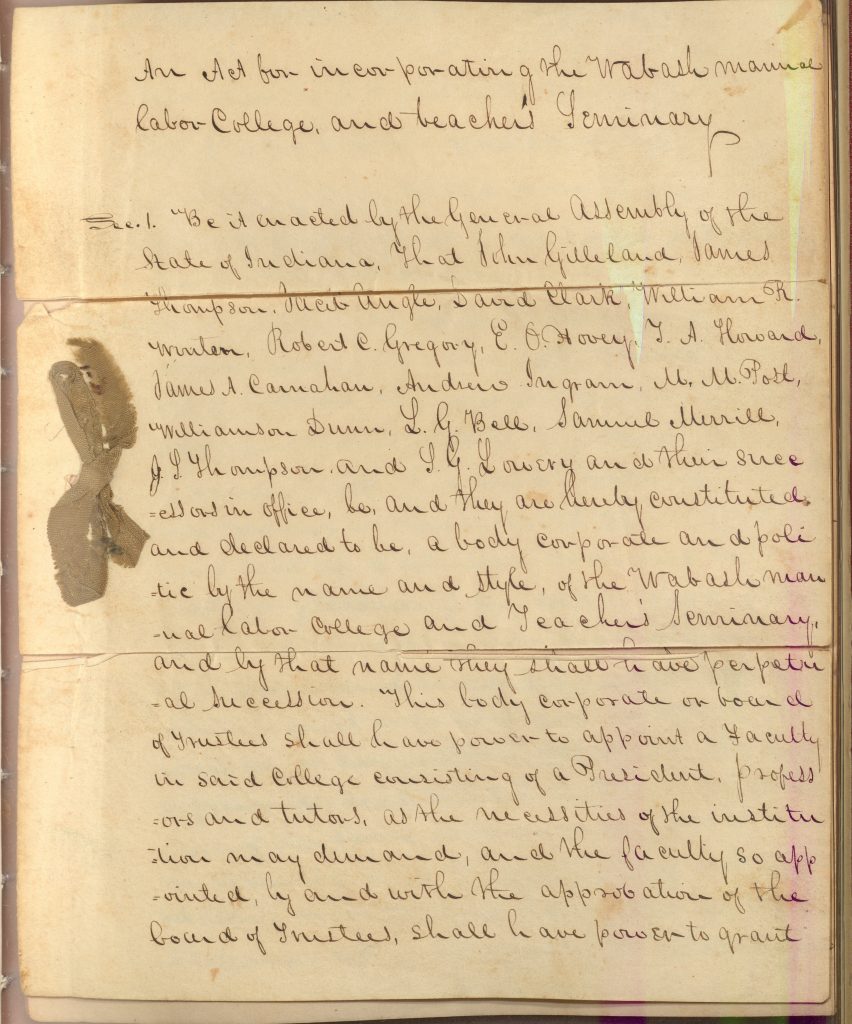Each month I intend to take you on a journey as I explore the Ramsay Archival Center’s wonderful collection, located at Wabash College’s Lilly Library. For each post, I will highlight an item and a person who has contributed directly to the history of Wabash College or by “spreading the fame of her honored name” as alums. So join me on my trip down Wabash’s memory lane and learn about the rich history and stories of Wabash College!
This month we will begin at the very beginning. No, not on November 21, 1832, when our nine founders came together “to found a college somewhere in the Wabash country.” I speak of the beginning of our Archival Collections, literally Box 1, Folder 1. This box holds documentation that relates to Wabash’s Charter. Our official Charter was granted on January 15, 1834, one hard-fought year after our founders met at the home of James Thomson. For the College to have its charter approved by the Indiana General Assembly, it needed to make two key concessions.
- Contributors to the college should be allowed to vote for trustees.
- Teaching be non-sectarian and have no direct connection to the Presbyterian Church.
Ultimately, Wabash would agree to these terms, and the charter was modified and approved. While this was not a compromise many of the founders wanted to make, it would be highly beneficial to the college as it moved forward throughout its history to grow and change to become the Wabash College we know today. The original charter is rarely seen and only makes appearances during the Inauguration of our College’s Presidents. It was last used for the Inauguration of Wabash’s 17th and current president, Scott Feller. The present charter for the College can be found in Title 23, Article 13, Chapter 19 of the 2021 Indiana Code.

Wabash College has had thousands of alums throughout its 190-year history, and many have done extraordinary things worldwide. Today I would like to tell you about one of those alums who had an impact right here in Indiana, John Edward Harper. John E. Harper graduated from Wabash’s Preparatory Department in 1899 and then Indiana University. John taught high school for over 50 years, beginning his career in Charleston, Mr. Vernon, and New Albany before joining the English Department at Crispus Attucks High School in 1927.

He would remain at Crispus Attucks until his retirement in 1951, where he was a beloved member of the faculty. Mr. Harper was passionate about dramatics and directed over 40 class plays, and assisted with other productions. In addition to his work with Crisups Attucks, John Harper was known throughout the Indianapolis community for his work with the Senate Avenue YMCA and the Older Boys’ Conference, which would grow to become Hi-Y with a reach not only in Indiana but Kentucky, Indiana, Illinois, and Ohio. In an article from the Indianapolis Recorder from August 11, 1951, upon his retirement, he is quoted as saying,
“There have been times when the boys tried to show their appreciation by awards which brought tears of joy to my eyes,”
He was awarded the Tri Hi-Y pin in the 1940s, the highest honor the organization could bestow and in 1950, the Metropolitan Board of the YMCA presented him with the YMCA service pin for his 15-year service to the organization. John Edward Harper passed away on April 22, 1959. In his honor, the “Y”s Oak Tree was planted on the grounds of the Fall Creek YMCA to represent the thousands of young boys whose lives were influenced by him.
John Edward Harper was indeed Some Little Giant!
For more information about John Edward Harper, please visit the following links:
Indianapolis Recorder database on Hoosier State Chronicles
John Edward Harper at Crispus Attucks High School
Fall Creek YMCA Collection, 1923-2002